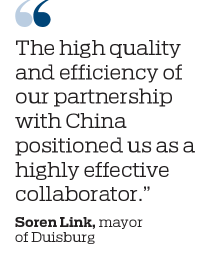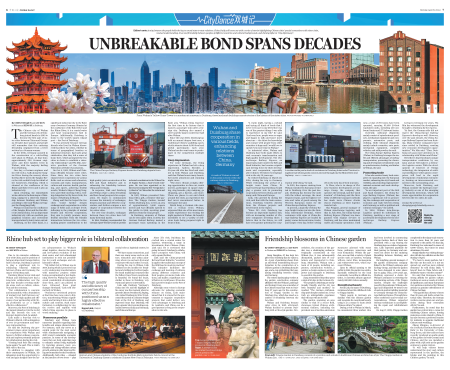


German and Chinese students of the Confucius Institute Metropolis Ruhr hold a concert at the University of Duisburg-Essen to celebrate Chinese New Year in February.
Due to its extensive collaboration with China and its position of being an important transportation hub in Europe, Duisburg is poised to play a significant role in enhancing bilateral relations between China and Germany, the mayor of Duisburg said.
Duisburg Mayor Soren Link said Wuhan and Duisburg have had a long-term collaboration over the past four decades covering multiple areas such as culture, education and the economy.
"Our collaboration is concrete and measurable, with a foundation of mutual trust built between us," he said. "The high quality and efficiency of our partnership with China positioned us as a highly effective collaborator."
Moreover, the Port of Duisburg is the largest inland port in the world and has become the core of Europe's logistics hub, he added.
Link made a four-day visit to Wuhan in March, with a delegation of over 20 government and business representatives.
He said the Duisburg city government places great importance on cooperation with Wuhan and hopes to further enhance cooperation and explore potential projects for collaboration during his visit.
"Coming back feels like coming home again," he said. This is Link's fifth visit to the city.
In addition to engaging with their counterparts in Wuhan, his delegation took the opportunity to visit and gain insights into the latest advancements in Wuhan's smart logistics, observe the green and low-carbon evolution of the steel sector, and visit educational institutions to seek out possibilities for youth exchanges and collaborative efforts.
"My initial visit to Wuhan was in 2014, during which I perceived it as a city undergoing transformation, with numerous projects either being conceptualized or just beginning. However, Wuhan has experienced considerable developments since then, and I am pleased to have witnessed these great changes firsthand," Link told China Daily in Wuhan.
"Numerous envisioned projects at that time have now come to fruition, transforming Wuhan significantly and turning it into a hub for culture and tourism. Such transformation is enlightening for me; the resolve and rapidity with which China executes its plans is worth studying."
Numerous parallels
Duisburg and Wuhan have numerous parallels regarding their benefits and unique characteristics. For instance, each city serves as a central point for the steel sector while simultaneously navigating a shift toward sustainable economic practices. In terms of city development, they are both exploring ways to enhance urban living standards by fostering greener, more eco-friendly and energy-efficient urban growth, aiming to offer improved living environments for their residents. Additionally, both cities — situated at the junction of two rivers — play crucial roles as logistical centers, he said.
"We have many connections, and there are many areas such as culture, education and urban planning, where we can learn from and cooperate with each other," he said.
During his stay in Wuhan, Link relished hot dry noodles for breakfast and strolling in riverfront parks. He found traditional structures like the Yellow Crane Tower exceptionally beautiful. He found the locals, similar to those in Duisburg, very warm and open to conversation.
Link calls Duisburg "Germany's China city". He said the highlight of his career was the moment when he greeted Chinese President Xi Jinping, who visited Duisburg in 2014. Xi welcomed the arrival of a Chinese freight train at the Port of Duisburg, and expressed hope that Duisburg will play a greater role in promoting cooperation between China and Germany, and China and Europe.
Since Xi's visit, Duisburg has evolved into a crucial center for logistics, witnessing a surge in investments from Chinese firms, Link said. He is convinced that going forward, Duisburg's collaborative prospects with China will only expand further.
Link said the China-proposed Belt and Road Initiative "essentially applies the traditional concept of the Silk Road to modern practices". This initiative facilitates the exchange and learning of cultures among different countries and their peoples, promotes trade relations, and makes a significant contribution to world peace. It has also had a positive impact on the Port of Duisburg.
Although some voices in Europe advocate for reducing economic reliance on China, Link maintained that it is crucial for the government to organize cooperative projects that could deliver concrete advantages to Duisburg and its residents, and China can be a good partner as long as the cooperation is win-win.

